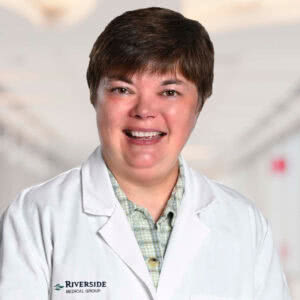Get the Facts on Chemotherapy

Advancements in cancer treatment over the years have led to better patient outcomes. Alongside surgery and radiation, chemotherapy exists as a primary treatment option.
Karen Verrill, Oncology Certified Nurse Practitioner at the Riverside Cancer Institute, shares information about chemotherapy—including how the drugs are administered, side effects, and misconceptions.
Not All Chemo Is Created Equal
Like other diseases, different variations of cancer require different types of chemotherapy. For example, one class of chemo drugs works to destroy cancer cells and keep them from replicating. Immunotherapy boosts or alters a cancer patient’s immune system. Hormone therapy is often used in certain breast, prostate, and endometrial (uterine) cancers. Chemotherapy can be administered in a number of ways, but the main two routes are intravenously or orally in pill form.
Once cancer is diagnosed, patients meet with their oncologist to identify the appropriate mix of therapies. “It’s at that time where they’ll determine if chemotherapy, radiation, or surgery is indicated. It could be all three, but it could also be just one of those,” explains Verrill.
Misconceptions and Side Effects
Because chemo has come so far, what was once true may no longer be. For example, not everyone who undergoes chemo loses their hair or is in a constant state of nausea. Verrill encourages new cancer patients and their family members to find trusted resources if doing research on their own.
“We always encourage our patients to seek out reliable sources on the internet, to help them in terms of seeking out the information they’re trying to find.”
That said, there are certain side effects patients should be aware of, including:
- risk of infection
- heightened bleeding risk
- hair loss
- gastrointestinal (GI) distress – nausea, vomiting, constipation
- mouth sores
Every individual responds differently, even if they’re receiving the same treatment. It can be a confusing, scary time, so Verrill urges patients to contact their medical providers with questions or concerns at any time.
“There is no way patients can remember everything told to them when they were first here to go through their treatment plan. It’s a very overwhelming situation for patients,” she shares. “I always tell them, I don’t care if you can’t remember if you’re supposed to do A or B, I want you to call us.”
The Riverside Cancer Institute can also guide with difficulties in one’s personal or work life. “We’re hired to help you. It’s a journey, and we walk that journey with you. We want to make it as easy as possible for you,” adds Verrill.
**To listen to an in-depth conversation on this topic with Karen Verrill, Oncology Certified Nurse Practitioner at the Riverside Cancer Institute, visit: Get the Facts Podcast
